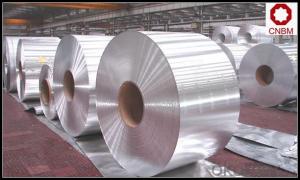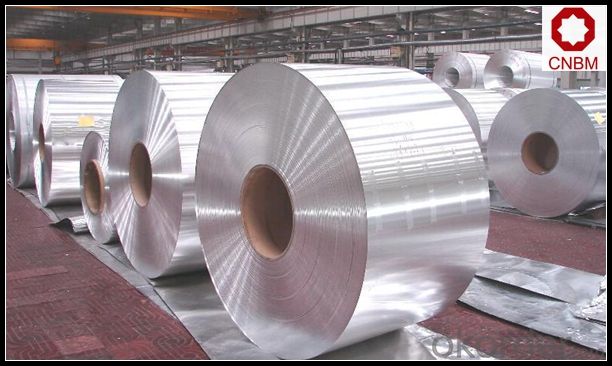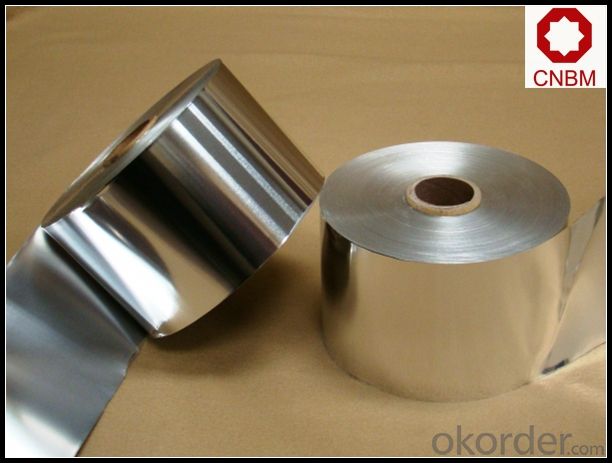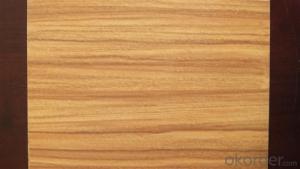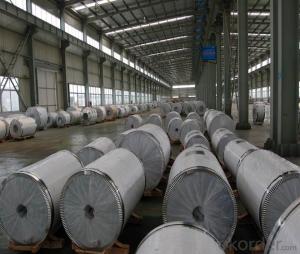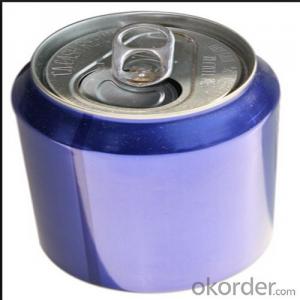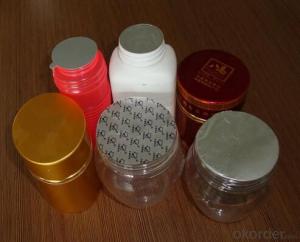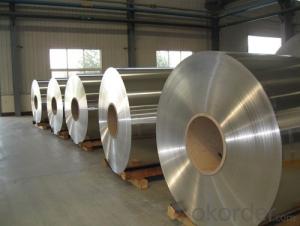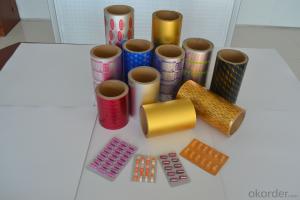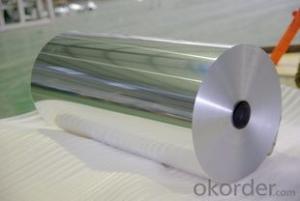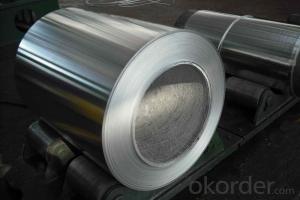Aslcoa Aluminum Coil 8011 Ho for Wine / Medicine PP Cap
- Loading Port:
- Shanghai
- Payment Terms:
- TT OR LC
- Min Order Qty:
- 5 m.t.
- Supply Capability:
- 10000 m.t./month
OKorder Service Pledge
OKorder Financial Service
You Might Also Like
Specification
1. Specification of 8011 HO Aluminum Coil for Wine / Medicine PP Cap
1) Alloy | 1050, 1060,1100, 3003 3004 3105 3A21 5005 5052 etc |
2) Temper | O/H12/H14/H1/H18/H32/H34/H36/H38//H111/H112/H116/H321/T6/T651/T3/T351 etc |
3) Thickness | 0.1mm to 6mm |
4) Width | 20mm to 3300mm |
5) Coil weight | 100kgs to 6 tons depends on actual requirement |
6) Core material | Aluminum or paper |
7) Coil Inner diameter | 75mm, 150mm, 200mm, 300mm, 405mm, 505mm or as required |
8) Protective film can be added
2. Application of 8011 HO Aluminum Coil for Wine / Medicine PP Cap
(1).Interior: wall cladding, ceilings, bathrooms, kitchens and balconies, shutters, doors...
(2).Exterior: wall cladding, facades, roofing, canopies, tunnels,column covers , renovations...
(3).Advertisement: display platforms, signboards, fascia, shop fronts...
3. Feature of 8011 HO Aluminum Coil for Wine / Medicine PP Cap
*Such coil is specially designed to replace aluminum ingot, due to the high export tax of aluminum ingot, the coil has better price than ingot.
*This type of coil can fit customer's remelting furnace just like ingot, no need to make any change to the production line that was previously used for ingot. The standard coil size and weight is very suitable for the feed gate of furnace.
*This type of coil causes less material wastage than ingot when remelted.
*Our coil is made directly from ore, no need to go though the ingot making process, quality is much better than other suppliers who use ingot scrap to make coil.
Be free from Oil Stain, Dent, Inclusion, Scratches, Stain, Oxide Dicoloration, Breaks, Corrosion, Roll Marks, Dirt Streaks and other defect which will interfere with use
4. Certificate:
SGS and ROHS(if client request, paid by client), MTC(plant provided), Certificate of Origin(FORM A, FORM E, CO), Bureau Veritas and SGS (if client request, paid by client), CIQS certificate
5. Image of 8011 HO Aluminum Coil for Wine / Medicine PP Cap
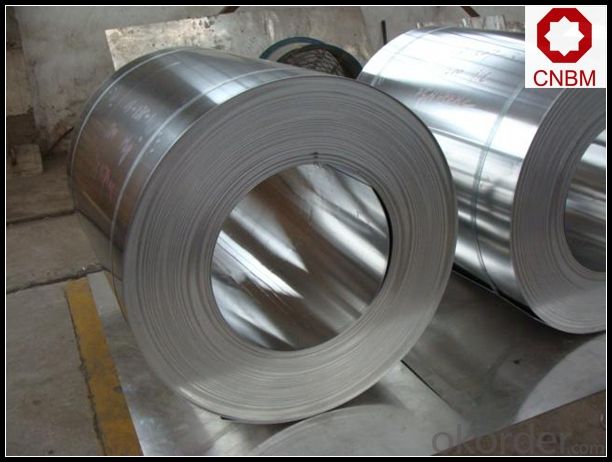
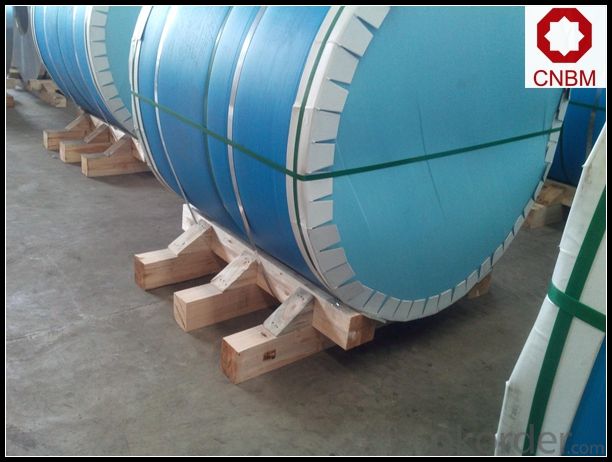
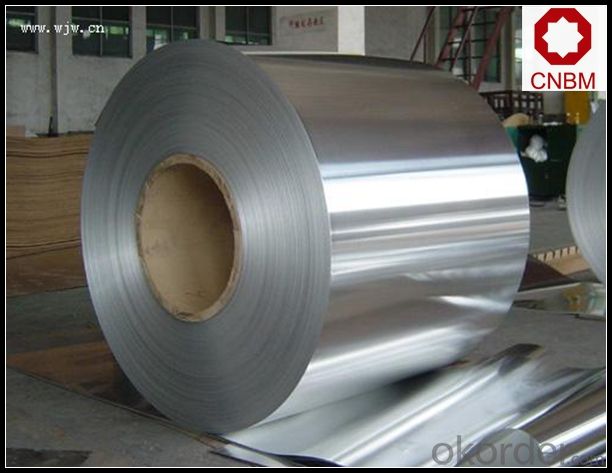
6. Package and shipping of 8011 HO Aluminum Coil for Wine / Medicine PP Cap
eye to wall
eye to the wall
with wood pallet (wooded case also available)
7. FAQ
1) What is the delivery time?
Dpends on actual order, around 20 to 35 days
2)What is the QC system:
We have QC staff of 20 persons and advanced equipment, each production is with MTC traced from Aluminum ingot lot.
3) What market do you mainly sell to?
Australia, America, Asia, Middle East, Western Europe, Africa etc
- Q: Are aluminum coils suitable for architectural louvers?
- Yes, aluminum coils are suitable for architectural louvers due to their lightweight nature, durability, and corrosion resistance. They can be easily shaped and formed into various louver designs, providing both functionality and aesthetic appeal to architectural structures.
- Q: Just want to know for any boat builders out there. I have been told by my local paddling store that there are no aluminum kayaks. Why couldn't i build one? it cant be weight, I would build the frame from 1/2 inch square aluminum tubing and the body out of 1/32 high grade sheeting. So why does something like this not exist?
- This Site Might Help You. RE: Why couldn't an aluminum kayak work? Just want to know for any boat builders out there. I have been told by my local paddling store that there are no aluminum kayaks. Why couldn't i build one? it cant be weight, I would build the frame from 1/2 inch square aluminum tubing and the body out of 1/32 high grade sheeting. So why does...
- Q: How do aluminum coils contribute to sustainable construction?
- Aluminum coils play a significant role in promoting sustainable construction practices due to their numerous environmental benefits. Firstly, aluminum is a highly recyclable material, with nearly 75% of all aluminum ever produced still in use today. This means that aluminum coils can be easily recycled at the end of their lifespan, reducing the demand for new raw materials and minimizing waste sent to landfills. Furthermore, the production process of aluminum coils requires significantly less energy compared to other materials such as steel. Aluminum coils have a low carbon footprint, as the energy consumed during their production is considerably lower, resulting in fewer greenhouse gas emissions. The reduced energy consumption also contributes to lower operating costs for construction projects, making it an economically viable choice. Additionally, aluminum coils are lightweight yet durable, making them an ideal choice for sustainable construction. Their lightweight nature reduces the need for heavy support structures, resulting in reduced material consumption and transportation costs. Moreover, the durability of aluminum coils ensures a longer lifespan, reducing the need for frequent replacement and minimizing waste generation. Aluminum coils also possess excellent corrosion resistance, which is crucial in sustainable construction. This resistance to corrosion means that structures made from aluminum coils require less maintenance and repair over time. Consequently, fewer resources are needed to maintain the integrity of the building, reducing the overall environmental impact. In conclusion, aluminum coils contribute to sustainable construction by being highly recyclable, energy-efficient, lightweight, durable, and corrosion-resistant. By choosing aluminum coils, construction projects can significantly reduce their environmental footprint, conserve resources, and promote a more sustainable built environment.
- Q: Can aluminum coils be used in HVAC heat exchangers?
- Yes, aluminum coils can be used in HVAC heat exchangers. Aluminum is a popular choice for heat exchangers due to its excellent thermal conductivity, light weight, and corrosion resistance. Aluminum coils are often used in air conditioning systems and heat pumps, where they transfer heat efficiently between the refrigerant and the surrounding air. Additionally, aluminum coils are easier to shape and form, allowing for more intricate designs and better heat transfer performance. Overall, aluminum coils are a reliable and effective choice for HVAC heat exchangers.
- Q: i have received an aluminium cooker,it's in good condition but the outside is discoloured by oil splatters.The body is round ,i have used baking soda+vineger( mix with water and boil for an hour) to clean the insides,it came off clean but outside i have no clue. used a lot of elbow grease,my hands are paining now..i have this thing for gleaming utensils ,any suggestions with homemade things,don't want to buy anything
- To clean discolored aluminum you can also heat 2 teaspoons cream of tarter per quart of water. It would be best to let the cooker soak in the mixture, but that might be difficult depending on the size of your cooker. Lemon juice or lime juice should also help because they have citric acid. You could cut a lemon in half and rub the halves on the cooker, then try scrubbing with something that has some texture to it (rough sponge or steel wool). The try the vinegar or cream of tarter mixture again. Whatever you use, don't try bleach as it is highly alkaline and dissolves aluminum. This leaves copper deposits can make it turn black.
- Q: How to identify the quality of color coated aluminum coil and sheet?
- Color coated aluminum coil is a kind of aluminum coil. As for qualified color coated aluminum coil, the surface has no impression, holiday and damage through the coating, and also no ripple, scratch and swell. All these are easy to see. However, the most important is the color difference of the color coated aluminum coil which is not obvious but will influence the decoration effect. Now the surface of curtain wall aluminum sheet will also be treated with electrostatic spraying. The power coating materials can have dozens of colors and realize good decorative effect, with polyurethane, polyethylene expansion resin and epoxy resin as raw materials, high color retention pigment as auxiliaries.
- Q: Aluminum roll, which companies are used?
- Too many things that you can see every day, with all the things that are made of aluminum, and the companies that make these aluminum products are useful, so it's unclear!
- Q: How are aluminum coils used in signage and advertising?
- Aluminum coils are commonly used in signage and advertising due to their versatility, durability, and cost-effectiveness. These coils are typically used to create sign panels that can be found in various settings, such as billboards, retail stores, airports, and public spaces. One of the main advantages of using aluminum coils in signage is their lightweight nature. This allows for easier installation and transportation, making it a preferred option for large-scale outdoor advertisements like billboards. Additionally, aluminum coils can be easily shaped and molded into different forms, allowing for creative and eye-catching designs that can effectively grab attention. Due to their durability, aluminum coils are highly resistant to weather conditions, including harsh sunlight, rain, and snow. This makes them ideal for outdoor signage that needs to withstand the elements. The material's corrosion resistance also ensures that the signage will maintain its appearance over time, extending its lifespan and reducing maintenance costs. Furthermore, aluminum coils can be coated or painted with different finishes, allowing for customization and branding. These finishes can range from vibrant colors to reflective or brushed effects, enhancing the visual impact of the signage. The smooth surface of aluminum coils also provides an excellent base for printing graphics and logos, resulting in high-quality and vibrant imagery. In terms of cost-effectiveness, aluminum coils are relatively affordable compared to other materials commonly used in signage, such as steel or plastic. The lightweight nature of aluminum also reduces shipping costs and simplifies installation, saving time and money for businesses or advertisers. Overall, aluminum coils play a crucial role in the signage and advertising industry, offering a versatile, durable, and cost-effective solution for creating visually appealing and long-lasting signs. Their lightweight nature, resistance to weather conditions, customizable finishes, and affordability make them a popular choice for a wide range of signage applications.
- Q: Can aluminum coils be used in the production of aluminum downspouts?
- Yes, aluminum coils can be used in the production of aluminum downspouts. Aluminum coils are typically made from high-quality aluminum alloy and are rolled into thin sheets. These coils can then be cut and formed into various shapes and sizes, including downspouts. Aluminum is a popular choice for downspouts due to its lightweight, durable, and corrosion-resistant properties. Additionally, aluminum coils can be easily manipulated and shaped to meet specific design requirements, making them suitable for manufacturing aluminum downspouts.
- Q: What are the weight savings achieved by using aluminum coils?
- Compared to materials like steel, significant weight savings can be achieved by using aluminum coils. Aluminum, a lightweight metal with a density approximately one-third that of steel, allows for greatly reduced overall weight when utilizing aluminum coils instead of steel coils. The benefits of weight savings attained through aluminum coil usage are numerous. In industries such as automotive and aerospace, reducing weight is crucial for enhancing fuel efficiency and increasing payload capacity. Lighter vehicles and aircraft require less energy for operation and can accommodate more passengers or cargo, resulting in cost savings, improved performance, and minimized environmental impact. Moreover, the weight savings obtained from aluminum coils can provide practical advantages in other applications as well. For instance, in HVAC systems, lighter coils facilitate easier installation and transportation, thereby reducing labor and logistics costs. The actual weight savings achieved by utilizing aluminum coils will vary depending on the specific application and design specifications. Nonetheless, it is widely acknowledged that aluminum coils offer a significant weight advantage over alternative materials. The actual weight savings can range from 30% to 70% or more, depending on the specific comparison being made. To summarize, the weight savings achieved through the use of aluminum coils can be substantial. This lightweight material offers numerous benefits in terms of fuel efficiency, payload capacity, performance, and cost savings. When prioritizing weight reduction, aluminum coils are an excellent choice for a wide range of industries and applications.
Send your message to us
Aslcoa Aluminum Coil 8011 Ho for Wine / Medicine PP Cap
- Loading Port:
- Shanghai
- Payment Terms:
- TT OR LC
- Min Order Qty:
- 5 m.t.
- Supply Capability:
- 10000 m.t./month
OKorder Service Pledge
OKorder Financial Service
Similar products
Hot products
Hot Searches
Related keywords
